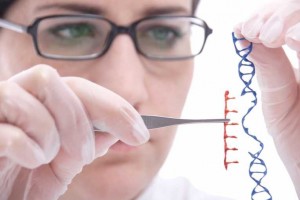Catholic Confusion on Enhancements
 I have to confess that I am a bit disheartened. I find that my fellow Catholics are having trouble really connecting with the Church’s teaching regarding genetic engineering. Some very smart, thoughtful and faithful Catholics are having difficulty with the distinction between gene therapy, which is genetic engineering to fix a genetic pathology, and genetic enhancement, which is genetic engineering to an otherwise healthy person to make them super-human in strength, intelligence, or infused with non-human traits like night vision or glow-in-the-dark skin.
I have to confess that I am a bit disheartened. I find that my fellow Catholics are having trouble really connecting with the Church’s teaching regarding genetic engineering. Some very smart, thoughtful and faithful Catholics are having difficulty with the distinction between gene therapy, which is genetic engineering to fix a genetic pathology, and genetic enhancement, which is genetic engineering to an otherwise healthy person to make them super-human in strength, intelligence, or infused with non-human traits like night vision or glow-in-the-dark skin.
I am frustrated because I realize I might not be articulating the distinction well enough.
Some argue that to defend the difference between therapy and enhancement, the Church has to define what is considered “normal” which is, of course, difficult to impossible. To decide who qualifies for therapy, they contend that somehow the Church has to decide what is considered “healthy” and what is not.
But the Church doesn’t need to do anything of the sort. Here is an analogy I think illustrates the Church teaching on many medical interventions, not just genetic engineering. Take “birth control.” A chemical concoction if taken by a healthy woman to thwart her natural fertility (making it no longer function properly) it is unethical. If taken as medicine to treat a significant pathology (a side effect being temporary sterility) then it is morally acceptable. It is all in the intent not the effect.
In no way does the Church need to define what is a normal level of fertility. It simply draws the line between when a chemical is used to pervert a normal human function (fertility) and when the same one used to treat a medical condition.
I think that same applies to genetic engineering. When a manipulation of the human genome is done to treat a genetic pathology, to improve life for or save the life of a patient and bring them back to a more normal human functioning, then it is morally acceptable. When the genetic engineering is done to pervert a system that is already functioning to enhance beyond what is possible by that individual’s nature, then it is immoral.
Will there be some seemingly gray areas? Likely. When is a pathology a pathology or just a variation? One person’s pathology maybe another’s variation. But that is why we have priests and bishops: to guide us in our individual situations.
I think when we focus on the minutia of every little nuance of every possibility we lose sight of the greater picture. Keeping genetic engineering in the realm of therapy (which is exactly where it currently resides), we can prevent some truly horrifying and unnatural modifications of the human genome. We will prevent the mixing of human and animal DNA and the tinkering with otherwise healthy offspring without their consent. Two things that clearly fall in the “immoral” box.
Just remember that science and academia are already toying with enhancements. The National Institutes of Health (NIH) awarded Maxwell Mehlman, director of the Law-Medicine Center at Case Western Reserve University School of Law, $773,000 to develop standards for tests on human subjects in genetic-enhancement research. Research that would take otherwise normal humans and make them smarter, stronger or better-looking. If the existing human-trial standards cannot meet the ethical conditions needed for genetic-enhancement research, Mehlman has been asked to recommend changes.
And a recent paper in the journal Ethics, Policy & Environment, S. Matthew Liao, a professor of philosophy and bioethics at New York University, explored ways humanity can change its nature to combat “climate change.” One of the suggestions Liao discusses is to genetically engineer human eyes to be like cat eyes so we can all see in the dark.
The intent of genetic manipulation needs to be therapeutic in nature. That principle alone rejects all manner of crazy and immoral ideas of what we can (but should not do) to ourselves and our offspring while still allowing for the possibility of healing and amelioration of suffering.

